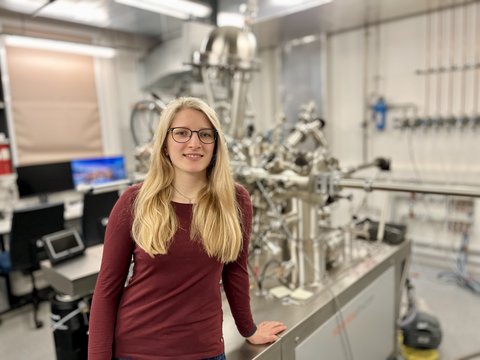
Verena Müller
Friedrich-Schiller-Universität
Helmholtzweg 4 | room K040
07743 Jena
tel: +49 3641–948755
Curriculum Vitae
Education
- 2021-2024
M.Sc. Chemistry, Friedrich Schiller University Jena
Master Thesis in the group of Prof. Dr. Andrey Turchanin: Investigation of self-assembled monolayers with carboxylic binding groups on Au and Ag substrates.
Specializations: Theoretical Chemistry, Macromolecular Chemistry
Additional module: Chemistry Studies 4.0: Digitization in Chemistry - 2018-2021
B.Sc. Chemistry, Friedrich Schiller University Jena
Bachelor Thesis in the group of Prof. Dr. Andrey Turchanin: Preparation and characterization of photosensitive nanomembranes.
Specialization: Theoretical Chemistry - 2015-2017
B.Sc. Biotechnological Chemistry, Ilmenau University of Technology
Training and Awards
- 2022-2023
The Honours Programme for future researchers, Friedrich Schiller University Jena
Conducted an independent research project under the supervision of Prof. Dr. Andrey Turchanin on the self-assembly of RuII-polypyridine complexes on surfaces for applications in modern photocatalysis.
Presentation of results at DPG spring conference 2022 and Bunsentagung 2023 with posters.
Work experience
- 11/2024-Present
PhD student, Institute of Physical Chemistry, Group of Prof. Dr. Andrey Turchanin, Friedrich Schiller University Jena - 11/2023-09/2024
Master student, Institute of Physical Chemistry, Group of Prof. Dr. Andrey Turchanin, Friedrich Schiller University Jena - 05/2023-07/2023
Student assistant scientist, Institute of Physical Chemistry, Group of Prof. Dr. Andrey Turchanin, Friedrich Schiller University Jena
Fabrication and characterization (XPS, PM-IRRAS) of photosensitive self-assembled monolayers. - 01/2023-03/2023
Student tutor, Institute of Physical Chemistry, Friedrich Schiller University Jena
Conducted seminars and practical courses on spectroscopy for undergraduate biology students and student teachers. - 09/2022-09/2022
Student tutor, Institute of Organic and Macromolecular Chemistry, Friedrich Schiller University Jena
Conducted practical course in organic chemistry for undergraduate biochemistry students. - 10/2021-03/2022
Student assistant scientist, Institute of Physical Chemistry, Group of Prof. Dr. Andrey Turchanin, Friedrich Schiller University Jena
Synthesis and characterization (XPS, Optical microscopy) of photosensitive self-assembled monolayers and carbon nanomembranes. - 03/2021-07/2021
Bachelor student, Institute of Physical Chemistry, Group of Prof. Dr. Andrey Turchanin, Friedrich Schiller University Jena - 08/2019-09/2019
Internship in analytics department – GPC/HPLC, Henkel AG & Co. KGaA, Düsseldorf.
Integration in routine analysis, supervision and training of trainee, teamwork - 05/2018-07/2018
Internship in analytics department – GPC/HPLC, Henkel AG & Co. KGaA, Düsseldorf.
Method development for routine analysis of polycarboxylates, routine analysis, teamwork.
PhD Project
Carbon nanomembranes with phototunable permeability
The project focuses on developing ultrathin, light-responsive carbon nanomembranes (CNMs) for ultrafiltration technologies. These novel 2D material-based nanomembranes are synthesized on a large scale via electron beam-induced crosslinking of aromatic self-assembled monolayers. CNMs possess remarkable properties, including thicknesses of approximately 1 nm, sub-nanometer porosity, and high mechanical and chemical stability. Additionally, a wide range of chemical functionalizations can be applied to CNMs. Furthermore, CNMs exhibit unique permeation properties, demonstrating roughly 1000 times higher permeation rates for H₂O than for He at room temperature. The permeation is driven by an adsorption-diffusion mechanism, which can be used to create highly selective and energy-efficient membranes.
The goal of the project is to further enhance the performance of CNMs by integrating photoswitches that enable light-controlled gas permeation. By switching between different molecular states under UV and visible light, the surface polarity can be altered, thereby tuning the permeability. We will study the influence of different gases and vapors, optimizing the functionalization to achieve maximum responsiveness employing highly sensitive mass spectrometry measurements. The tailored synthesis of CNMs will be supported by advanced, surface-sensitive material characterization techniques, including complementary photoelectron spectroscopy (XPS, UPS), scanning probe techniques (AFM, STM, SEM), and contact angle measurements.